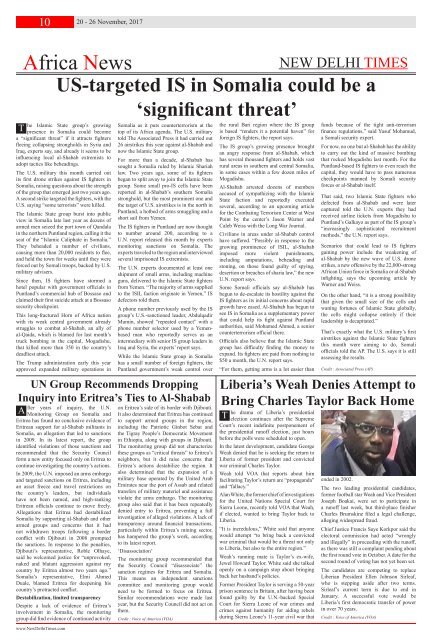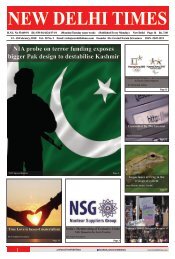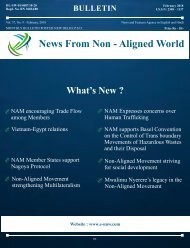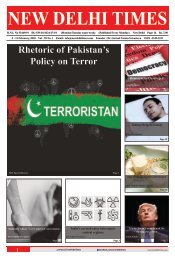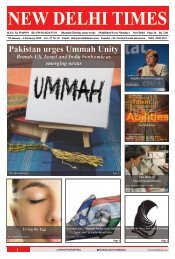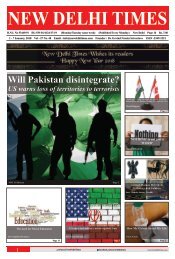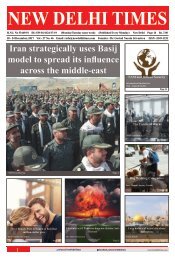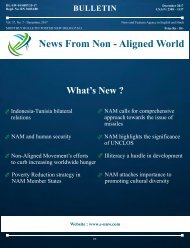20 - 26 November 2017 - 16-min
Create successful ePaper yourself
Turn your PDF publications into a flip-book with our unique Google optimized e-Paper software.
10<br />
<strong>20</strong> - <strong>26</strong> <strong>November</strong>, <strong>20</strong>17<br />
T<br />
A<br />
Africa News<br />
US-targeted IS in Somalia could be a<br />
he Islamic State group’s growing<br />
presence in Somalia could become<br />
a “significant threat” if it attracts fighters<br />
fleeing collapsing strongholds in Syria and<br />
Iraq, experts say, and already it seems to be<br />
influencing local al-Shabab extremists to<br />
adopt tactics like beheadings.<br />
The U.S. military this month carried out<br />
its first drone strikes against IS fighters in<br />
Somalia, raising questions about the strength<br />
of the group that emerged just two years ago.<br />
A second strike targeted the fighters, with the<br />
U.S. saying “some terrorists” were killed.<br />
The Islamic State group burst into public<br />
view in Somalia late last year as dozens of<br />
armed men seized the port town of Qandala<br />
in the northern Puntland region, calling it the<br />
seat of the “Islamic Caliphate in Somalia.”<br />
They beheaded a number of civilians,<br />
causing more than <strong>20</strong>,000 residents to flee,<br />
and held the town for weeks until they were<br />
forced out by Somali troops, backed by U.S.<br />
military advisers.<br />
Since then, IS fighters have stormed a<br />
hotel popular with government officials in<br />
Puntland’s commercial hub of Bossaso and<br />
claimed their first suicide attack at a Bossaso<br />
security checkpoint.<br />
This long-fractured Horn of Africa nation<br />
with its weak central government already<br />
struggles to combat al-Shabab, an ally of<br />
al-Qaida, which is blamed for last month’s<br />
truck bombing in the capital, Mogadishu,<br />
that killed more than 350 in the country’s<br />
deadliest attack.<br />
The Trump ad<strong>min</strong>istration early this year<br />
approved expanded military operations in<br />
www.NewDelhiTimes.com<br />
‘significant threat’<br />
Somalia as it puts counterterrorism at the<br />
top of its Africa agenda. The U.S. military<br />
told The Associated Press it had carried out<br />
<strong>26</strong> airstrikes this year against al-Shabab and<br />
now the Islamic State group.<br />
For more than a decade, al-Shabab has<br />
sought a Somalia ruled by Islamic Shariah<br />
law. Two years ago, some of its fighters<br />
began to split away to join the Islamic State<br />
group. Some small pro-IS cells have been<br />
reported in al-Shabab’s southern Somalia<br />
stronghold, but the most pro<strong>min</strong>ent one and<br />
the target of U.S. airstrikes is in the north in<br />
Puntland, a hotbed of arms smuggling and a<br />
short sail from Yemen.<br />
The IS fighters in Puntland are now thought<br />
to number around <strong>20</strong>0, according to a<br />
U.N. report released this month by experts<br />
monitoring sanctions on Somalia. The<br />
experts traveled to the region and interviewed<br />
several imprisoned IS extremists.<br />
The U.N. experts documented at least one<br />
shipment of small arms, including machine<br />
guns, delivered to the Islamic State fighters<br />
from Yemen. “The majority of arms supplied<br />
to the ISIL faction originate in Yemen,” IS<br />
defectors told them.<br />
A phone number previously used by the IS<br />
group’s U.S.-sanctioned leader, Abdulqadir<br />
Mu<strong>min</strong>, showed “repeated contact” with a<br />
phone number selector used by a Yemenbased<br />
man who reportedly serves as an<br />
intermediary with senior IS group leaders in<br />
Iraq and Syria, the experts’ report says.<br />
While the Islamic State group in Somalia<br />
has a small number of foreign fighters, the<br />
Puntland government’s weak control over<br />
UN Group Recommends Dropping<br />
Inquiry into Eritrea’s Ties to Al-Shabab<br />
fter years of inquiry, the U.N.<br />
Monitoring Group on Somalia and<br />
Eritrea has found no conclusive evidence of<br />
Eritrean support for al-Shabab militants in<br />
Somalia, an allegation that led to sanctions<br />
in <strong>20</strong>09. In its latest report, the group<br />
identified violations of those sanctions and<br />
recommended that the Security Council<br />
form a new entity focused only on Eritrea to<br />
continue investigating the country’s actions.<br />
In <strong>20</strong>09, the U.N. imposed an arms embargo<br />
and targeted sanctions on Eritrea, including<br />
an asset freeze and travel restrictions on<br />
the country’s leaders, but individuals<br />
have not been named, and high-ranking<br />
Eritrean officials continue to move freely.<br />
Allegations that Eritrea had destabilized<br />
Somalia by supporting al-Shabab and other<br />
armed groups and concerns that it had<br />
not withdrawn troops following a border<br />
conflict with Djibouti in <strong>20</strong>08 prompted<br />
the sanctions. In response to the penalties,<br />
Djibouti’s representative, Roble Olhaye,<br />
said he welcomed justice for “unprovoked,<br />
naked and blatant aggression against my<br />
country by Eritrea almost two years ago.”<br />
Somalia’s representative, Elmi Ahmed<br />
Duale, blamed Eritrea for deepening his<br />
country’s protracted conflict.<br />
Destabilization, limited transparency<br />
Despite a lack of evidence of Eritrea’s<br />
involvement in Somalia, the monitoring<br />
group did find evidence of continued activity<br />
on Eritrea’s side of its border with Djibouti.<br />
It also deter<strong>min</strong>ed that Eritrea has continued<br />
to support armed groups in the region,<br />
including the Patriotic Ginbot Sebat and<br />
the Tigray People’s Democratic Movement<br />
in Ethiopia, along with groups in Djibouti.<br />
The monitoring group did not characterize<br />
these groups as “critical threats” to Eritrea’s<br />
neighbors, but it did raise concerns that<br />
Eritrea’s actions destabilize the region. It<br />
also deter<strong>min</strong>ed that the expansion of a<br />
military base operated by the United Arab<br />
Emirates near the port of Assab and related<br />
transfers of military materiel and assistance<br />
violate the arms embargo. The monitoring<br />
group also said that it has been repeatedly<br />
denied entry to Eritrea, preventing a full<br />
investigation of alleged violations. A lack of<br />
transparency around financial transactions,<br />
particularly within Eritrea’s <strong>min</strong>ing sector,<br />
has hampered the group’s work, according<br />
to its latest report.<br />
‘Disassociation’<br />
The monitoring group recommended that<br />
the Security Council “disassociate” the<br />
sanction regimes for Eritrea and Somalia.<br />
This means an independent sanctions<br />
committee and monitoring group would<br />
need to be formed to focus on Eritrea.<br />
Similar recommendations were made last<br />
year, but the Security Council did not act on<br />
them.<br />
Credit : Voice of America (VOA)<br />
the rural Bari region where the IS group<br />
is based “renders it a potential haven” for<br />
foreign IS fighters, the report says.<br />
The IS group’s growing presence brought<br />
an angry response from al-Shabab, which<br />
has several thousand fighters and holds vast<br />
rural areas in southern and central Somalia,<br />
in some cases within a few dozen miles of<br />
Mogadishu.<br />
Al-Shabab arrested dozens of members<br />
accused of sympathizing with the Islamic<br />
State faction and reportedly executed<br />
several, according to an upco<strong>min</strong>g article<br />
for the Combating Terrorism Center at West<br />
Point by the center’s Jason Warner and<br />
Caleb Weiss with the Long War Journal.<br />
Civilians in areas under al-Shabab control<br />
have suffered. “Possibly in response to the<br />
growing pro<strong>min</strong>ence of ISIL, al-Shabab<br />
imposed more violent punishments,<br />
including amputations, beheading and<br />
stoning, on those found guilty of spying,<br />
desertion or breaches of sharia law,” the new<br />
U.N. report says.<br />
Some Somali officials say al-Shabab has<br />
begun to de-escalate its hostility against the<br />
IS fighters as its initial concerns about rapid<br />
growth have eased. Al-Shabab has begun to<br />
see IS in Somalia as a supplementary power<br />
that could help its fight against Puntland<br />
authorities, said Mohamed Ahmed, a senior<br />
counterterrorism official there.<br />
Officials also believe that the Islamic State<br />
group has difficulty finding the money to<br />
expand. Its fighters are paid from nothing to<br />
$50 a month, the U.N. report says.<br />
“For them, getting arms is a lot easier than<br />
T<br />
NEW DELHI TIMES<br />
funds because of the tight anti-terrorism<br />
finance regulations,” said Yusuf Mohamud,<br />
a Somali security expert.<br />
For now, no one but al-Shabab has the ability<br />
to carry out the kind of massive bombing<br />
that rocked Mogadishu last month. For the<br />
Puntland-based IS fighters to even reach the<br />
capital, they would have to pass numerous<br />
checkpoints manned by Somali security<br />
forces or al-Shabab itself.<br />
That said, two Islamic State fighters who<br />
defected from al-Shabab and were later<br />
captured told the U.N. experts they had<br />
received airline tickets from Mogadishu to<br />
Puntland’s Galkayo as part of the IS group’s<br />
“increasingly sophisticated recruitment<br />
methods,” the U.N. report says.<br />
Scenarios that could lead to IS fighters<br />
gaining power include the weakening of<br />
al-Shabab by the new wave of U.S. drone<br />
strikes, a new offensive by the 22,000-strong<br />
African Union force in Somalia or al-Shabab<br />
infighting, says the upco<strong>min</strong>g article by<br />
Warner and Weiss.<br />
On the other hand, “it is a strong possibility<br />
that given the small size of the cells and<br />
waning fortunes of Islamic State globally,<br />
the cells might collapse entirely if their<br />
leadership is decapitated.”<br />
That’s exactly what the U.S. military’s first<br />
airstrikes against the Islamic State fighters<br />
this month were ai<strong>min</strong>g to do, Somali<br />
officials told the AP. The U.S. says it is still<br />
assessing the results.<br />
Credit : Associated Press (AP)<br />
Liberia’s Weah Denies Attempt to<br />
Bring Charles Taylor Back Home<br />
he drama of Liberia’s presidential<br />
election continues after the Supreme<br />
Court’s recent indefinite postponement of<br />
the presidential runoff election, just hours<br />
before the polls were scheduled to open.<br />
In the latest development, candidate George<br />
Weah denied that he is seeking the return to<br />
Liberia of former president and convicted<br />
war cri<strong>min</strong>al Charles Taylor.<br />
Weah told VOA that reports about him<br />
facilitating Taylor’s return are “propaganda”<br />
and “fallacy.”<br />
Alan White, the former chief of investigations<br />
for the United Nations Special Court for<br />
Sierra Leone, recently told VOA that Weah,<br />
if elected, wanted to bring Taylor back to<br />
Liberia.<br />
“It is incredulous,” White said that anyone<br />
would attempt “to bring back a convicted<br />
war cri<strong>min</strong>al that would be a threat not only<br />
to Liberia, but also to the entire region.”<br />
Weah’s running mate is Taylor’s ex-wife,<br />
Jewel Howard Taylor. White said she talked<br />
openly on a campaign stop about bringing<br />
back her husband’s policies.<br />
Former President Taylor is serving a 50-year<br />
prison sentence in Britain, after having been<br />
found guilty by the U.N.-backed Special<br />
Court for Sierra Leone of war crimes and<br />
crimes against humanity for aiding rebels<br />
during Sierra Leone’s 11-year civil war that<br />
ended in <strong>20</strong>02.<br />
The two leading presidential candidates,<br />
former football star Weah and Vice President<br />
Joseph Boakai, were set to participate in<br />
a runoff last week, but third-place finisher<br />
Charles Brumskine filed a legal challenge,<br />
alleging widespread fraud.<br />
Chief Justice Francis Saye Korkpor said the<br />
electoral commission had acted “wrongly<br />
and illegally” in proceeding with the runoff,<br />
as there was still a complaint pending about<br />
the first round vote in October. A date for the<br />
second round of voting has not yet been set.<br />
The candidates are competing to replace<br />
Liberian President Ellen Johnson Sirleaf,<br />
who is stepping aside after two terms.<br />
Sirleaf’s current term is due to end in<br />
January. A successful vote would be<br />
Liberia’s first democratic transfer of power<br />
in over 70 years.<br />
Credit : Voice of America (VOA)


